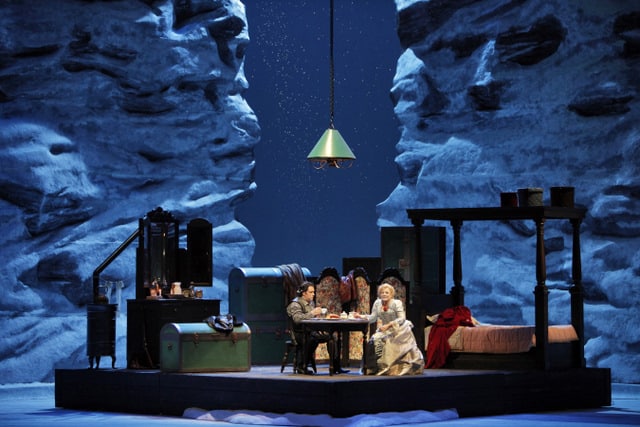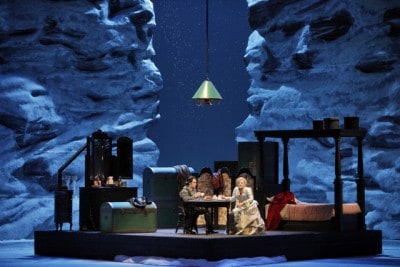La Fanciulla del West (The Girl of the Golden West)
Location: San Francisco Opera
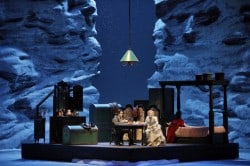
“Love Triangle with Role Reversal in the Gold Rush” is more descriptive than “The First Spaghetti Western”
This reviewer attended San Francisco Opera’s performance of Puccini’s “La Fanciulla del West” (“The Girl of the Golden West”) on Saturday, admittedly approaching the opera with a mild bit of cynicism in reaction to SF Opera’s marketing it as “The First Spaghetti Western”. Half-expecting to be subjected to an overly done “Americanized” production of Puccini’s adaptation of the play by Berloni (whose play “Madama Butterfly” was the basis for Puccini’s then most-recent work), I found myself treated to an enjoyable and entertaining opera in the true Italian tradition, with some truly memorable and also thought-provoking moments along the way.
“Cinematic” was the first word to come to mind from the very first orchestra opening notes and the unusually quick curtain rise. Big tympani notes led directly to the unveiling of a dramatic floor-to-ceiling set showing several miners suspended by ropes moving down a mining shaft face with picks. The set was then gradually pieced together by the male chorus during the introduction, and we witnessed “The Polka” come to life – the mining town’s watering hole – physically set at the bottom of the mine shaft. This creative set design was not only visually dramatic, but it set a strong backdrop overtone and scenic analogy for the sense of submersion, isolation, loneliness, and despair that each of the miners feels (and sings about) – and yet also a strong sense of the rules-within-the-wild-west-lawlessness that is enforced by the miners’ strong sense of community and black-or-white morality, particularly vis a vis cheating and theft.
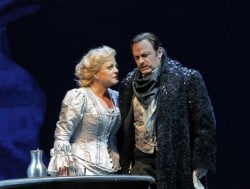
The opera cast is, unusually, comprised entirely of men save for the lead role of Minnie (the owner of the bar, and the sister/mother figure to all of the miners, each of whom would much prefer her romantic attentions) and her Native American servant. The opening scenes include a beautiful male chorus scene with the town’s “minstrel” (Jake) singing about how homesick the mining life really is. This number was rendered with touching simplicity – this reviewer especially noted SF Opera’s music director Nicola Luisotti’s impeccable technique and control. In an especially poignant and almost sotto voce passage, Luisotti reduced his baton movement to an almost minimal amount of motion – and yet the large male chorus stayed perfectly together and time and pitch. Later, during the first duet between Minnie and Rance, Luisotti created several memorable moments through impressively-controlled rubatos (stretching of tempo) in the orchestra during phrase endings and transitions. (Readers should note that Luisotti has a great deal of choral conducting experience, beginning at age 11, and is also the Principal Guest Conductor of the Tokyo Symphony.)
Local chuckles
Since the opera is set in the Gold Rush in 1849-50, there are a few moments where the libretto (in Italian with sprinkles of English words like “Hello”) created some amusing meta-performance moments when performed in San Francisco’s War Memorial Opera House. For example when Ashby introduces himself as “The agent of Wells Fargo”, a scattering of giggles emerged from the audience. Similar chuckles erupted later when someone announces that there is a stranger wanting to come into Minnie’s bar but he wants to drink his whiskey with water, leading Minnie to conclude “he must be a stranger from San Francisco”.
These moments caused this reviewer, originally a Boston native, to reflect on how unique the audience experience for La Fanciulla must be in San Francisco compared to almost any other opera house in the world. For those of us from “Back East” the Gold Rush still evokes notions of romance, freedom, individualism, and entrepreneurship; one can only imagine how grander still the romantic and exotic feeling about “The West” must have been in Puccini’s home country in 1910 (this production is the first US production to celebrate the 100th anniversary of La Fanciulla’s debut). To his credit, Puccini was attracted to the realism written into the original play by Belasco (himself a child of early settlers during the Gold Rush) and preserved the sense of despair by the miners during his operatic adaptation.
World-class voices, mixed bag on acting
Deborah Voigt as Minnie is a real operagoer’s treat. Her voice is a powerful dramatic soprano, and her stage presence is commanding and energetic – perfect for the fearlessly independent – and yet still saving-myself-for-the-right-man chaste – “Girl of the Golden West”. From her first entrance commandingly punctuated by three warning shots from her rifle, to her last exit where she, in quite a reversal of roles, arrives as the heroine-on-horseback to save her man, Voigt’s stage presence lights up the stage with a persona and demeanor reminiscent to this reviewer of a youthful Angela Lansbury. Her singing, facial expressions, theatrical gestures, and body movement are all in well-aligned flow. Voigt delivered several memorable moments: her opening scene where she is teaching a bible class to the miners avoids any of the awkwardness that a lesser performer might have with the libretto and plot; the line “I have yet to give my first kiss” is sung without becoming schmaltzy (and yet this reviewer’s notes read “Now this is an Italian opera!”), and towards the end of Act I when she sings “If anyone wants that gold they have to get past me” Voigt unleashes some BIG and dramatic high notes full of tone and passion.
Rance, the married sheriff hopelessly in love with Minnie, is delivered much less successfully by Roberto Frontali. Although his dramatic baritone voice is powerful and impressive, his acting and stage presence are so flat, especially in contrast to Voigt’s Minnie, as to undermine Rance’s leg in the 3-legged love triangle stool.
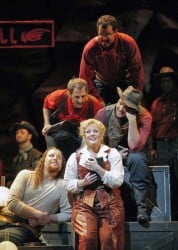
Johnson, the stranger (from Sacramento he says, and also the bandit Ramerrez), is sung by tenor Salvatore Licitra. Licitra is a true Italian tenor, cut from the same cloth of Italian singing as many of the world’s most famous tenors. This reviewer found his voice to be exciting and rich throughout most of his range, except for an odd sudden loss of head resonance only on his high B’s and C’s, taking all of the power and drama out of some of Johnson’s solo apexes.
Simple but powerful set moves
While I normally only focus on the musical and acting performance aspects of an opera, I feel compelled to comment briefly on the set design. Act I, as already described, takes place in “The Polka”, a bar located at the bottom of the mine. The back of the set is an imposing rock wall. Act II is a simple homestead, Minnie’s home, and yet the last scene (the poker match between Minnie and Rance where they are gambling for Johnson’s and Minnie’s freedom) features a simple but powerful set move where the outer parts of the house move away to the edges of the stage, leaving only the center table with Minnie and Rance “dueling” through poker spotlighted in the center. A somewhat similar set move at the end of the opera, where the rock wall separates exposing a beautifully painted landscape backdrop, showing the eventual destination for Johnson and Minnie as they must leave California, serves as a visual bookend to the isolation of the mine shaft at the opera’s opening, and is a visually ironic contrast to the sad tragedy of Johnson’s rescue but the couple’s forced departure.
Final rant – we’re not a little frontier town any more and we shouldn’t act like it
Once again this reviewer was dismayed, distraught, disheartened, embarrassed, and ashamed of the behavior by the audience at the final curtain. Even before the curtain hit the stage there were streams of “patrons” making a beeline for the exits – not, as a hardworking performer might misinterpret, because of a negative reaction to the performance – but rather because people are in a rush to beat the traffic out of the Performing Arts Parking Garage, or to beat the traffic on the roads, or to save a few bucks on their babysitting fees, or some other lame reason. People – your involvement with the performance doesn’t end with the last note – it ends when the performers have all had a chance to take their bows. Leaving before then is rude, bush league, minor city backwoods behavior. If you have the resources to purchase tickets to the opera, please have the class to behave as if you belong.


